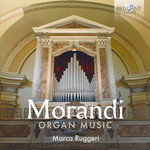
Morandi: Organ Music
 $25.00
Out of Stock
$25.00
Out of Stock6+ weeks add to cart
GIOVANNI MORANDI
Morandi: Organ Music
Marco Ruggeri
[ Brilliant Classics / 2 CD ]
Release Date: Friday 22 July 2016
This item is currently out of stock. It may take 6 or more weeks to obtain from when you place your order as this is a specialist product.
First and foremost this set should offer a great deal of fun to organists and
connoisseurs of organ music who are familiar with the rousing sorties of other
19th‐century composers such as Lemare and Lefébure‐Wély, but who are curious about a lesser‐known name. Over two discs, Marco Ruggeri presents an array of music for mostly liturgical purposes by Giovanni Morandi (1777‐1856). There are various voluntaries to be played at the Offertory, the Elevation and after Communion, and these are meditative in mood, written in
the style of a plausibly Italian admirer of César Franck. Interspersed with them are the much more boisterous Allegro marziale, several sinfonias, a variation set, a Rondo with bell imitations and the splendidly titled 'Good save the Queen - Inno Inglese dell'immortale Heudel in F' - this is exactly how the work
appeared in an Italian music catalogue of the time. Whether the spelling mistakes originated with Morandi or his publisher is now lost in the mists of time, but the work itself should raise smiles no less than the title. His wife was an opera‐singer, and he often accompanied her on her tours; he wrote a vast amount of music, much of it influenced by the operatic culture in which
he was immersed. The organs used on this recording are an instrument made by the Venetian builder Gaetano Callido for the Parish church of SS Simon and Thaddeus in Borca di Cadore in the province of Belluno (CD1); and on CD2, an 1830 instrument built by Antonio and Angelo Amati for the Parish church of SS Peter and Paul in Provaglio d'Iseo, Brescia. Full organ specifications are listed in the booklet, which also contains colour photographs of the organs and a brief introduction to the historical context of Morandi's music.
Tracks:
Organ music by Giovanni Morandi
Organ of Borca di Cadore, by Gaetano Callido
Organ of Provaglio d'Iseo, by Antonio and Angelo Amati